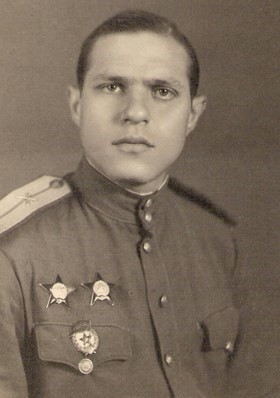
Robert Borok
Robert Borok was born in 1922 in Odessa into a worker's family. In the interwar period, the family moved to Kharkov, Ukraine. In 1939, upon finishing high school, Robert entered an artillery school in the city. From there, he was transferred to the 1st Moscow Artillery School.
With the beginning of Operation Barbarossa in June 1941, the cadets continued their studies. Only in October 1941, when the enemy was approaching Moscow, were they deployed in its defense. With the elimination of danger to the city, in November, the cadets were returned to the 1st Artillery School. There Robert learned a new specialty – the operation of Katiusha rocket launchers.
In the spring of 1942, Lieutenant Borok was sent to the front. In May 1942, he took part in the Red Army's abortive Second Kharkov operation, which was followed by the major Soviet retreat eastward to Voronezh and Stalingrad in the summer and fall of that year. Borok's regiment fought near Voronezh. In the summer of 1943, Robert took part in the Kursk Salient Operation, and in October and November of 1943 – in the forcing of the Dnieper River. The company in which he was serving was a "penal" one since Borok had been punished as a result of his conflicts with senior officers. Then, with the 616th Mortar Regiment, he fought his way through Western Ukraine and Poland, where he was seriously wounded. After being released from hospital, at the end of 1944, he returned to his regiment. In 1945, he took part in the forcing of the Oder River and in the storming of Berlin. On May 8, 1945, Victory Day, he was still fighting in Czechoslovakia.
Borok was awarded three orders: the Red Star (in the summer of 1944), a second Red Star (for his role in forcing the Oder), and the Order of the Patriotic War, 2nd Class (for the capture of Berlin). He believed that he should have received more orders and medals, but this was thwarted by his reputation for being a "hooligan." More than once, both during and after the war, while he was serving in Germany, he heard antisemitic insults. Although some of the latter were relatively mild, each time he reacted with his fists.
When he was in Germany, Lieutenant Borok tried to prevent soldiers from committing atrocities against the German civilian population but, as he admitted in an interview he gave in 2007, "I did not feel the slightest pity for the Germans."
"All those phrases [such as] – we are not at war with the innocent civilian population, or the German civilians are not guilty of anything – did not find a response in my heart. I am a Jew, and after all that the Germans did to my people, I was ready to kill every single one of them with an unperturbed soul" – he said.1
After the war, Borok returned to Kharkov, graduated from university, and worked as a school physics teacher. He immigrated to Israel and died in 2010 in Jerusalem.
On antisemitism at the frontline and after the VE Day.
In his book of memoirs, Robert Borok recollected:
"It was a matter of luck. Many did not hear an offensive word about their nationality, or even some mockery directed toward them, while others had a really hard time ….
Once, a ridiculous incident occurred. The platoon that I commanded came up to me, and the soldiers said: 'Comrade Lieutenant, we have beaten the Fourth Battery now. They called you a Jew.' I answered my soldiers – 'So what? They were correct. I am Jewish. And the commander of the Fourth Battery, Shlionskii, is also a Jew. And in our own battery, Mogilevich and Rosenfeld are also Jews. What is so special about that?' My boys scratched their heads thoughtfully and silently and then said: 'Just the same, we'll hit them once more tomorrow! We will give them something in advance.'
But right after the war, the 'national question' emerged..., in full force.
After Victory Day, when we were stationed in Germany:
"… [S]ome time later, the drunken head of communications of the regiment called me by phone, and, I do not now remember exactly on what occasion it was, declared – 'Yids are not human beings!.' I repeated his words and asked him: 'Do you want to get it in the face?' He answered: 'You won't dare!' In the regiment I already had the reputation of being a hooligan, but I could not put up with this calmly. I said to this captain: 'Just wait a bit: I'll come to you and we'll see who dares!' I came to his 'office', and he had already positioned a soldier near, one from my own regimental command platoon. I said to the soldier: 'Left! Rear march!' The communications officer shouted at him: 'Remain at attention!', but the
I punched the communication man as he well deserved, but to his credit, I must say, although he was a vile person, he did not run to headquarters to denounce me.
After that incident I wondered why this was happening in the Soviet Union .... And how long I would still have to use my fists in response to such insults ...."
Robert Borok, Moia voina. Jerusalem: Dostoianie, 2008, pp. 25-26






